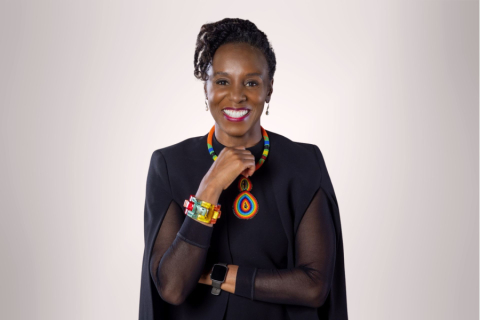Movement Emodiology
Professor Ama Wray Leads Embodiology® Workshop for UC Irvine’s College of Health Sciences
How can movement reawaken awareness, empathy and creative confidence in high-pressure environments? For Professor S. Ama Wray of the Department of Dance at the UC Irvine Claire Trevor School of the Arts, the answer lies in Embodiology — a practice she created that draws on African performance traditions and neuroscience to restore body-mind awareness.
On May 8, Wray led an immersive Embodiology workshop for students, faculty and caregivers across UCI’s College of Health Sciences. The event marked the inaugural offering in a new series funded through the Dr. Frank L. Meyskens & Linda Meyskens Medical Humanities and Arts Workshop Endowment, administered by the UCI School of Medicine.
“The meta-awareness that Embodiology practices illuminate aims to support well-being, adaptability and in-the-moment critical decision-making that caregivers make every day,” said Wray, who was joined by medical student facilitators from her medical improv course and guest healing artist reelaviolette botts-ward, Ph.D., founder of blackwomxhealing. Live music was also woven throughout the experience, reinforcing Embodiology’s core principle of being rhythmically present and dynamically responsive.
For Wray, whose career bridges performance, research and pedagogy, the workshop offered an opportunity to introduce healthcare learners to embodied approaches that cultivate resilience, joy and deeper self-connection.
“Dr. Meyskens is a truly inspired physician and researcher who has produced an impressive body of scientific work, grounded in his care for humanity,” said Wray. “His insights into the arts come from his own expression as a poet. I know him to be especially fond of jazz music, and he understands the healing power of movement.”
The relationship between Wray and Meyskens began more than a decade ago, when he attended a performance featuring UCI students who had traveled with Wray to Ghana to study African dance traditions. Inspired by the work, Meyskens saw the potential for bringing embodied practices like Embodiology into the world of medical education.
“Conversations with him over many years have led me to comprehend, from the most fundamental biological and physical levels of understanding, that the study of movement is at the core of deepening our comprehension of human advancement,” said Wray, “radiating out to the planets, the universe and beyond.”
As a teaching artist and researcher, Wray continues to advocate for the role of the arts in reimagining health and healing. Her practice, which has been utilized in medical, educational, and artistic settings globally, is designed to be accessible and transformative, equipping participants with tools to cultivate internal calm and external responsiveness.
To learn more about S. Ama Wray’s work, visit her Department of Dance bio page here.

